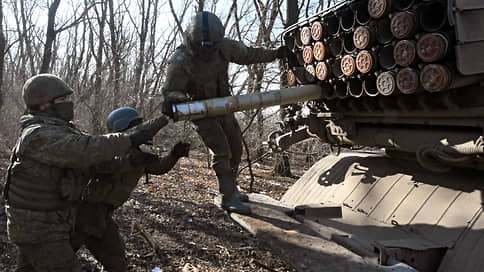Discredit will be compared with the Constitution – Kommersant
[ad_1]

The Constitutional Court (CC) of the Russian Federation registered the complaints of eight people challenging the legality of Art. 20.3.3 of the Code of Administrative Offenses of the Russian Federation on discrediting the armed forces. All of them were fined for criticizing the decision to send Russian troops into Ukraine and believe that the punishment violates their constitutional rights to freedom of speech and assembly. Previously, the applicants were refused in all instances, including the Supreme Court of the Russian Federation. The expert confirms that the question of the constitutionality of the article of the Code of Administrative Offenses may well be raised, but warns that the decision of the Constitutional Court will more likely finally “cement” this rule than lead to its revision.
The database of the Constitutional Court contains complaints of eight people fined at various times for discrediting the army. Thus, the applicant Maxim Filippov in April 2022 went to the monument to Alexander Pushkin for a solo picket “in order to express his critical opinion about the use of the Russian Armed Forces in Ukraine” (the text of the complaint is available from Kommersant). In his hands he held a homemade poster “with a quote from John Lennon’s song ‘Give Peace a Chance’ and a crossed-out image of a bomb.” For this, the Tverskoy District Court of Moscow fined him 50 thousand rubles. according to part 1 of Art. 20.3.3 of the Code of Administrative Offenses of the Russian Federation. In his complaint, Mr. Filippov calls this article unconstitutional, because, in his opinion, it violates the rights of citizens to freedom of conscience, thought and speech, freedom of assembly, and also contradicts the principle of equality and the prohibition of discrimination. “Only those opinions and beliefs that are associated with a critical assessment of the use of the armed forces are administratively punishable,” Mr. Filippov draws attention.
The complaint cites the position of the Constitutional Court, which previously allowed the restriction of the rights of citizens by federal laws “in order to protect constitutionally significant values with the obligatory observance of the principles of necessity, proportionality and proportionality.” However, Art. 20.3.3 of the Code of Administrative Offenses of the Russian Federation “introduces a restriction on freedom of conscience, thought, speech and assembly, which does not pursue a constitutionally permissible goal,” the applicant believes.
Article 20.3.3 of the Code of Administrative Offenses of the Russian Federation on public actions aimed at discrediting the armed forces appeared in the code almost immediately after the start of the special operation – on March 4, 2022. In March 2023, the article was supplemented – now the punishment is also provided for discrediting “volunteer formations”. Citizens face up to 100 thousand rubles. a fine, to officials – up to 300 thousand rubles, to legal entities – up to 1 million rubles. From the statistics of the Judicial Department under the Supreme Court, it follows that in 2022, the courts considered 5442 protocols under Article 20.3.3 of the Code of Administrative Offenses, issuing one warning and fine 4440 people for 151.3 million rubles. Let’s add if any of the parts of Art. 20.3.3 of the Code of Administrative Offenses to violate again within a year, then the person faces a new art. 280.3 of the Criminal Code – “public actions aimed at discrediting the use of the aircraft.” Here the maximum punishment is up to 5 years, and in case of serious consequences – up to 7 years in prison.
It should be noted that Maxim Filippov appealed the fine first to the Moscow City Court, then to the Second Court of Cassation of General Jurisdiction and, finally, to the Supreme Court of the Russian Federation, but was refused everywhere. Thus, in the decision of the Supreme Court of November 30, 2022, it is said that the applicant demonstrated in a public place “a means of visual agitation”, which “attracted the attention of an unlimited circle of people”, as well as the media. “The content of … the campaign clearly expressed a negative attitude towards the Armed Forces of the Russian Federation,” the definition of the Armed Forces says.
Other applicants have gone a similar way to the Constitutional Court, says Mr. Filippov’s lawyer from OVD-Info (recognized as a foreign agent), Violetta Fitzner. According to Mrs. Fitzner, Art. 20.3.3 of the Code of Administrative Offenses of the Russian Federation was “adopted in order to suppress any objectionable opinions” about the introduction of troops into the territory of Ukraine. “At the same time, it doesn’t matter in what form a person expresses his opinion or what he specifically says. Any such criticism is considered defamatory and subject to punishment. The article pursues the unconstitutional goal of suppressing dissent in society. Such legislation is simply unacceptable in a democratic society,” the lawyer believes.
“On the one hand, these issues are of a constitutional nature, and they should be raised before the Constitutional Court,” Ivan Brikulsky, a lawyer in the field of constitutional law, agrees. “But on the other hand, we should not forget that lawyers, like doctors, have important the demand is “do no harm”. This means that sometimes not having a solution is better than having one. Will it not happen that lawyers, by their own efforts, will help to “cement” this norm also at the constitutional level? After all, this will not only be a law, but also a full-fledged decision of the Constitutional Court.”
[ad_2]
Source link








